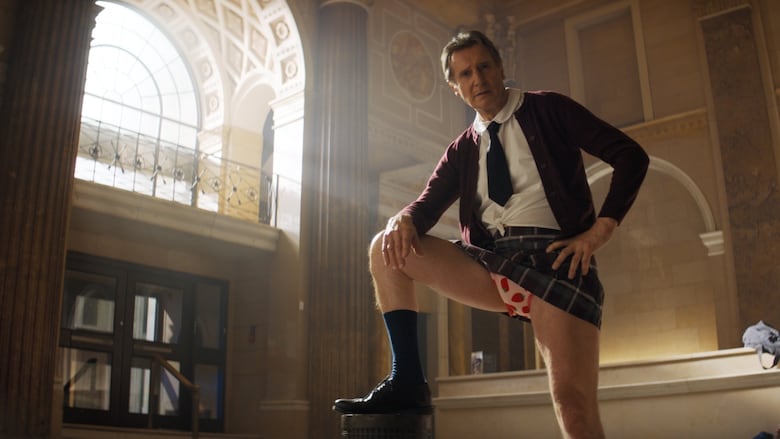The Naked Gun reboot is 'trying to constantly make you laugh'
Film critics Alison Willmore and Adam Nayman discuss why the comedy film feels like a rare gem

The Naked Gun, a classic cop spoof franchise from the late '80s, has now been rebooted for a new generation.
The fourth film in the series stars Liam Neeson as Lt. Frank Drebin Jr., who must work to prevent the closure of Police Squad by — you guessed it — solving a case.
The film also features Pamela Anderson, and is directed by The Lonely Island's Akiva Schaffer as well as produced by Seth MacFarlane, the creator of Family Guy. With such prolific comedy minds behind it, perhaps it's unsurprising that the film has received great reviews from audiences and critics alike for its commitment to packing as many jokes in on-screen as possible.
Today on Commotion, film critics Alison Willmore and Adam Nayman join guest host Rad Simonpillai to talk about The Naked Gun, and why this just might be the summer of the comedy reboot.
We've included some highlights below, edited for length and clarity. For the full discussion, including a conversation about Happy Gilmore 2, listen and follow Commotion with Elamin Abdelmahmoud on your favourite podcast player.
Rad: Alison, how are you seeing this Naked Gun kind of drawing from the original, but also standing apart from it?
Alison: You know, it is a spoof. The original Naked Gun was a spoof of these very serious-faced cop dramas. And in some ways, this Naked Gun is riffing on the idea of spoofing those, because it's a sort of cop drama that isn't even really the kind that we're doing now, right? It's not really making fun of Law & Order….
The reason that I was excited for it coming from [director] Akiva Schaffer, who is someone who I think really understands and is, like, a comedy dork … is that it just understands that this is a movie that should be dense with jokes. And they should be silly jokes that come at a speed and a pace, and be unapologetically goofy, or language-based or sight-gag-based in a way that I don't think you get nearly as much anymore. So to see something that is just trying to constantly make you laugh in the moment does feel rare.
Rad: You said "in a way that we don't get anymore," and Adam, I think you kind of pointed that out in your review. You said a lot of the jokes in this movie are the kind that we just don't get nowadays. I think I know what you were getting at there, but can you explain that?
Adam: The whole Zucker-Abrahams-Zucker, ZAZ thing when they started in the '70s was predicated on the idea that these were ancient jokes back then, you know? And the movies kind of keep moving the goalposts in terms of cultural references. There's a great running joke in this where Liam Neeson is nostalgic specifically for the year 2002. Like, he talks about the movie Chicago, and his TiVo and Catherine Zeta-Jones. They're always old jokes. So I think the joy of the ZAZ thing is that the old jokes always work. You just put a new surface on them. And that is something that [Seth] MacFarlane and Schaffer, who are aging Gen Xers, understand and embrace. Because Family Guy, maybe more than The Lonely Island, but both of those as comedy institutions are under the sign of Zucker, Abrahams and Zucker — that joke density, that idea that you watch the background as much as the foreground, the idea that something that's really, really stupid, if it's specific, comes all the way back around to being funny. So I think they honour their source material, without betraying what makes their own work funny.
And then to Alison's point, it is making fun of and playing with cop films, and then melding it with some sort of hyper-contemporary stuff like AI, and big tech, and Elon Musk and self-driving cars — not because it has any kind of analytical, social-critical agenda. Just because those surfaces help those jokes work. And it's so important … that Neeson is old, or older, because he is a living link to, I think, an analog era of movie-making. Even though he's not an '80s star, he has some of what Leslie Nielsen had, which is he just sweats credibility as a guy who is kind of actually in movies like this. And that's one of the reasons, on top of him being so talented, why he is so funny in this movie.
You can listen to the full discussion from today's show on CBC Listen or on our podcast, Commotion with Elamin Abdelmahmoud, available wherever you get your podcasts.
Panel produced by Jess Low and Stuart Berman.